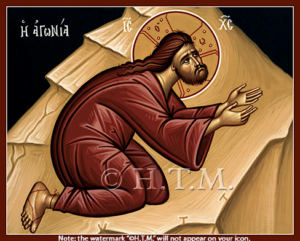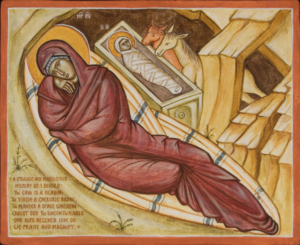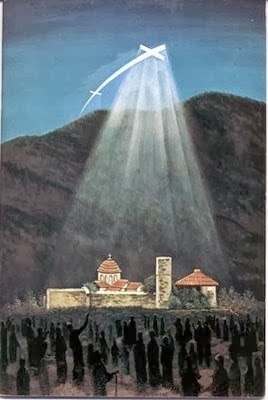 Beloved Faithful,
Beloved Faithful,
How joyous was our celebration of the holy Nativity of Our Saviour! How great the grace we received at the sacred Baptism of Our Saviour and through the blessing of the Waters! I think back on the Vigil procession in the snow, our meal together on Nativity morning, and the amazing singing of Carols together. Let us all thank God for His love towards us through the whole Festive Nativity Season and for all the days ahead.
Now, in just over a week, we shall enter together into the Fast of Great Lent. And so I thought it would be good for us to take a moment to gather our thoughts on Lent ahead of its arrival.
Let us start out on the Lenten path together and remember that we do so with innumerable past generations of Orthodox Christians who went before us. We move forward into Lent with the prayerful support of two thousand years of holy Saints, and as a Parish, in supporting each other, we witness with them the Truth of our holy Faith, and the salvific works of our great God and Saviour Jesus Christ.
And so, let us begin the course of the Fast well. As our Metropolitan Andrew said, “Let us learn the humility of the Publican. And think about how the next action you take will advance you before God”. Let us “fight the good fight”, as the holy Apostle Paul instructs us and begin with eagerness! Our Holy Orthodox Church established this Fast as a time of prayer, a time of repentance, a time for almsgiving, as a time of mutual forgiveness and love, and as a time of quiet reflection leading to the great victory of Pascha.
The Triodion is the Church Service book for Great Lent, and as we have already started to chant from it, I went forward to the first days of the Fast and here is what the initial Services tell us:
“With joy let us enter upon the beginning of the Fast”,
“Let us joyfully begin the all-hallowed season of abstinence,
And let us shine with the bright radiance of the holy commandments”,
And we shall also soon hear the incredibly compunctionate prayer of Saint Ephraim:
“O Lord and Master of my life, a spirit of idleness, curiosity, ambition, and idle talk, give me not.
But a spirit of chastity, humility, patience, and love, bestow upon me, Thy servant.
Yea, O Lord King, grant me to see mine own failings and not to condemn my brother; for blessed art Thou unto the ages of ages. Amen. “
May Our Saviour bless our endeavours, grant us a beneficial Season of the Fast, and bring us all together to celebrate with joy the Resurrection of Our Saviour.
Father Anthony
 Beloved Faithful,
Beloved Faithful, The first appearance of the honored Cross occurred in the year 312, in October, during the time of St. Constantine the Great. It appeared in the sky at noontime and was composed of radiant stars, with the words, “By This, Conquer”. Thus, by this first manifestation, the honored Cross became the labarum, the standard, of the first Christian empire, which served the purpose of proclaiming and conveying our Orthodox Christian faith and piety throughout the known world.
The first appearance of the honored Cross occurred in the year 312, in October, during the time of St. Constantine the Great. It appeared in the sky at noontime and was composed of radiant stars, with the words, “By This, Conquer”. Thus, by this first manifestation, the honored Cross became the labarum, the standard, of the first Christian empire, which served the purpose of proclaiming and conveying our Orthodox Christian faith and piety throughout the known world.